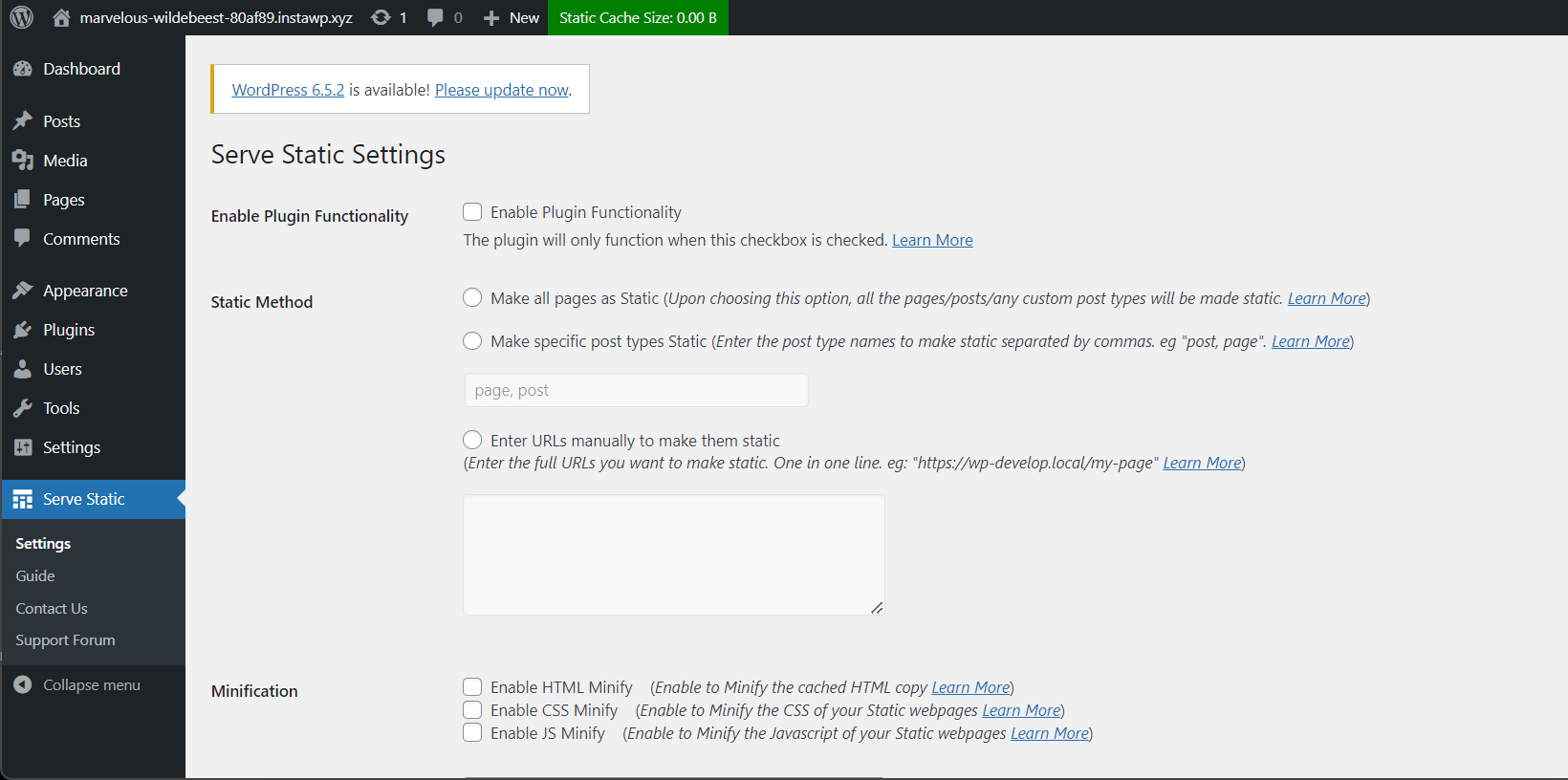Serve Static Wordpress Plugin - Rating, Reviews, Demo & Download

Plugin Description
Serve Static provides a very efficient, simple and fast way of implementing static page caching in WordPress.
It will generate static HTML copies of your webpages which will be then served using your server rewrite rules. This feature will bypass the whole PHP process and render only a simple HTML file without having to interect with the PHP, or MySQL for getting your page’s design or content.
This plugin is really handy and helpful if your webpages are mainly static, like websites of Blogs, portfolios, company portfolios, service, and many more. This plugin doesn’t support any dynamic content caching, that means, all none of your dynamic content will be showing in the frontend, rather, a static version of that content will be showing.
This plugin also comes with home-made HTML, CSS and JS minification features, which you can use to auto-minify the static files. This ensures more lightness of the HTML pages, and more boost to your page speed. Also, you can auto-warm the cache using the Warm feature, which will stimulate a visit on all your pages, to create the static files before they are served to your visitors.
Usage
After activating the plugin, it will try to modify your .htaccess file. If this is not possible for some reason, make sure to enter the rules by yourself. NOTE: without these .htaccess rules, the static files won’t be served or created. Note that, this is only applicable if you are using a Apache/Litespeed server.
# BEGIN Serve Static Cache
RewriteEngine On
RewriteBase /
RewriteCond %{HTTP_COOKIE} !(^|;s*)wordpress_logged_in_.*$ [NC]
RewriteCond %{REQUEST_URI} !^/(elementor|vc_row|fl_builder|fl-theme-builder) [NC]
RewriteCond %{REQUEST_URI} !^/wp-admin/ [NC]
RewriteCond %{REQUEST_METHOD} GET
RewriteCond %{QUERY_STRING} ^$ [NC]
RewriteCond %{DOCUMENT_ROOT}/wp-content/html-cache/$1/index.html -f
RewriteRule ^(.*)$ /wp-content/html-cache/$1/index.html [L]
# END Serve Static Cache
When using a nginx server, make sure to add the following rules:
# BEGIN Serve Static Cache
location / {
if ($http_cookie !~* "wordpress_logged_in_") {
set $cache_uri $request_uri;
if ($request_uri ~* "^/(elementor|vc_row|fl_builder|fl-theme-builder)") {
set $cache_uri "null cache";
}
if ($request_uri ~* "^/wp-admin/") {
set $cache_uri "null cache";
}
if ($request_method = GET) {
set $cache_uri "null cache";
}
if (-f $document_root/wp-content/html-cache$cache_uri/index.html) {
set $cache_file $document_root/wp-content/html-cache$cache_uri/index.html;
}
if ($cache_file) {
rewrite ^ /wp-content/html-cache$cache_uri/index.html break;
}
}
}
# END Serve Static Cache
This plugin creates static HTML versions of your pages/posts, or literally any custom post types, and serves them to your non-logged-in visitors. This is an awesome way to make your website blazing fast, and not even one request is made to PHP to request your pages.
Anytime a Static page/post/any custom post type is updated, the cache of that specific page is automatically cleared, and regenerated. So, you do not have to worry about regenerating the cache eac time after making changes to your content.
This plugin is also well-integrated with frontend post rating plugins as well, so that when any rating is added, the cache gets regenerated automatically. If you are using any rating plugins that are not working with this plugin, kindly let me know in the support forum.
This plugin heavily relies on CRON to process it’s functionalities. So please make sure either your server-level cron or WordPress Cron is running and working. If not, this plugin will show errors in the Admin Notices to help you direct to the problem. If there are still many issues, kindly share in the plugin support thread.
By default, this plugin automatically works with Apache and Litespeed servers, and everywhere .htaccess rules is functional. But to make this plugin work with NGINX, you will be needing to add some rules to your nginx.conf or site.conf file. An appropiate admin notice will be shown to you accordingly, kindly follow those instructions.
This plugin is supposed to work with all the form builder plugins like WP Forms, Ninja Forms. If you face any issues while using any form plugin, kindly let me know in the thread, and I will try to make it compitable.
Performance
Converting your website to a static webpage can drastically improve your performance and page speed. Serve Static eliminates all requests made to your database and ultimately reducing the first time to byte, total blocking time and many more.
This is especially impactful for websites that have mainly static pages, and use long pages with a lot of graphs, sliders, and other load-heavy resources like animations.
Reduce hosting bandwidth
Using Serve Static to serve static HTML pages of your website really cuts a great cost in your bandwidth usage, as this doesn’t hit the MySQL server for your visitors, but instead serves delivers a cached, minified HTML copy. This releases much of your cost, alongside the page boost.
We are working on features like “hosting your Static pages in a third party CDN, and serving those to your visitors”. If you are interested to see this feature in soon, let me know by opening a supprt thread!
NOTE
Caching is fully disabled for Administrators, or any logged-in users. Static Cache will only be served to logged-out visitors of your site.
Note that, the Static Cache can only be regenerated by using the buttons in the admin toolbar, or in the Settings page. After the cache is Flushed, the cache is NOT regenerated when someone visits the pages. This is done so that none of the personalized content gets saved in the HTML caches.
This plugin may not work as expected with a caching plugin like WP Rocket or W3 Total Cache. So make sure the URLs of the static pages are excluded from the specific plugins.
For example, when using WP Rocket, you need to navigate under Settings > WP Rocket > Advanced Rules > Never Cache URLs, and enter the URLs to the pages you want to serve as Static.
When using W3 Total Cache, navigate under Performance > Page cache > Advanced > Never cache the following pages.





